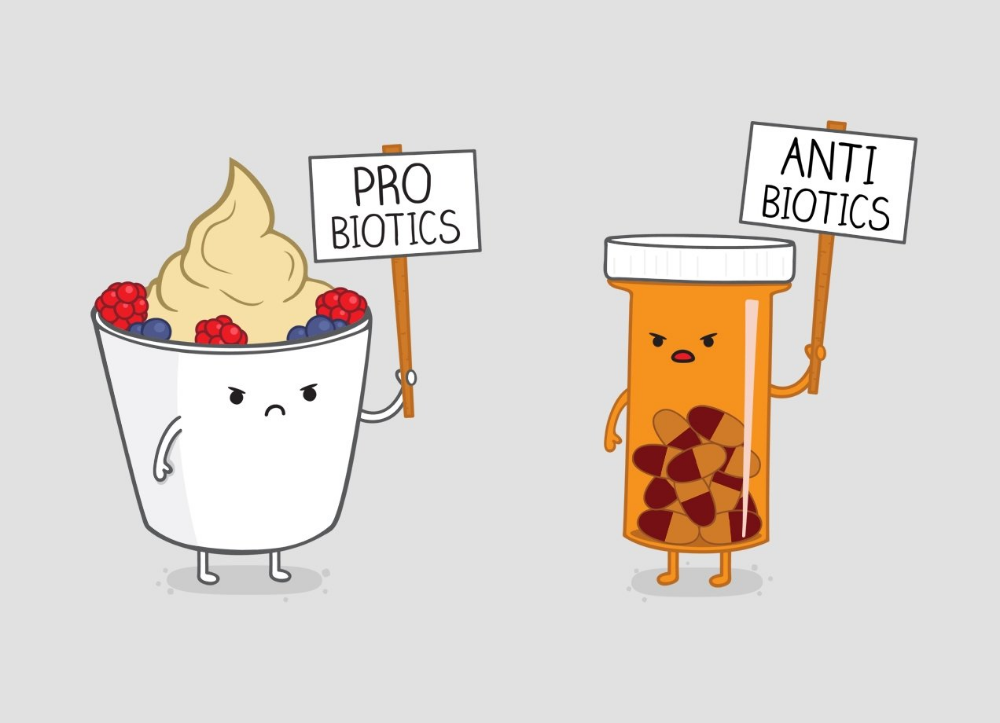
“Think of these trillions of microbes living in your gut as dinner party guests. What you serve these guests will decide who leaves the party and who stays and invites more friends.”
- Liz Keller

How to Optimize Your Gut Health
You may have seen the phrases “leaky gut” and “microbiome” or “microbiota” when reading about gut health but were not quite sure what they meant. Or maybe you’ve heard that probiotics and prebiotics are good for you, but you don’t really know why. I want to clarify some confusing concepts and let you know these ideas are not just the next health fad but rather something important that you should start learning about, specifically: how your gut health impacts your overall health.
What is the Microbiome?
The microbiome is a relatively new concept, with the term only being coined in 2001. The human microbiota consists of 10-100 trillion symbiotic microbial cells, consisting primarily of bacteria in the gut. The human microbiome consists of the genes these cells contain. These two terms are often used interchangeably, causing some confusion. The trillions of microbial cells in the gut microbiota are over 10x more than the human cells in your entire body! Sometimes referred to as “bugs,” these bacteria play a role in digesting food and moving nutrients to where they need to go, keeping the immune system healthy, protecting the body from infections, removing toxins, and synthesizing essential vitamins. Even though scientists are still in the very early stages of understanding the mechanisms in which the microbiome impacts health, they know what can improve and damage your gut.
How does our microbiota influence our overall health?
 Healthy gut bacteria has been shown to influence the risk of developing heart disease and type 2 diabetes, improve athletic performance, and even influence how much visceral fat (belly fat) you have. The definition of a healthy gut microbiota is having more of the desirable “good” bacteria than the undesirable “bad” bacteria. What we eat is one of the factors that decide which group of these bacteria gets to multiply. From birth, our microbiome is influenced by our mother’s diet, how we were delivered, whether we were breastfed or formula-fed, and then by the food we were given. Think of these trillions of microbes living in your gut as dinner party guests. What you serve these guests will decide who leaves the party and who stays and invites more friends. It is easy to imagine we do not want the type of microbes that like to eat greasy fast food and toxins staying too long at the party and making a mess of the place, but if that’s what we are serving, that’s who is going to stick around!
Healthy gut bacteria has been shown to influence the risk of developing heart disease and type 2 diabetes, improve athletic performance, and even influence how much visceral fat (belly fat) you have. The definition of a healthy gut microbiota is having more of the desirable “good” bacteria than the undesirable “bad” bacteria. What we eat is one of the factors that decide which group of these bacteria gets to multiply. From birth, our microbiome is influenced by our mother’s diet, how we were delivered, whether we were breastfed or formula-fed, and then by the food we were given. Think of these trillions of microbes living in your gut as dinner party guests. What you serve these guests will decide who leaves the party and who stays and invites more friends. It is easy to imagine we do not want the type of microbes that like to eat greasy fast food and toxins staying too long at the party and making a mess of the place, but if that’s what we are serving, that’s who is going to stick around!
What is Leaky Gut?
Currently, leaky gut, also known as intestinal permeability, is not something that a doctor commonly diagnoses. Your digestive system acts as the first line of defense against toxic substances and harmful foods. The only thing separating your digestive system from your bloodstream is a single-cell-deep lining of your gut and stomach. This lining of cells acts as a selective barrier to allow crucial nutrients to get into the bloodstream and keep unwanted substances out. This selective barrier is made up of “tight junctions,” which is where most of your bacteria hang out. The bacteria hang out there to receive nutrients to survive and protect the tight junctions and the gut lining. Things like antibiotics, certain medications, environmental toxins, conventionally raised meats, glyphosate and other chemical pesticides, antibiotics, sugar, lectins, and certain proteins found in gluten, like zonulin and agglutinin, are all known to damage your tight junctions and destroy your beneficial and protective bacteria. That can lead to a condition known as leaky gut. Leaky gut has been associated with nearly every chronic condition, including autoimmune diseases, diabetes, inflammatory bowel disease, multiple sclerosis, asthma, celiac disease, and even common conditions like acne, rosacea, headaches, and fatigue!
Evidence from scientific studies shows that our gut microbes have critical metabolic and immune functions related to their genetic material. Unfortunately, scientists have not yet figured out completely which microbes do what. Based on current science, the main goal is to have a diverse gut microbiome with a wide array of different types of microbes and microbial genes.
Healthy Habits to Optimize Your Gut Health
- Eat whole foods
- Avoid processed foods
- Avoid excessive sugar (from candy, sweets, and refined carbs)
- Enjoy polyphenols from fruit, tea, and cocoa
- Try probiotic foods like yogurt, kimchi, kefir, and sauerkraut
- Eat colorful vegetables
- The good “bugs” love pomegranate, cranberries, blueberries, artichokes, broccoli, spinach, and kale
- Eat foods high in fiber
- This includes vegetables and fruits, but also nuts, beans, and whole grains
- Eat healthy fats
- Omega 3-fats and monosaturated fats found in olive oil, avocados, nuts, and seeds have been shown to decrease inflammation. Inflammation in the body can damage healthy bacteria and stop them from flourishing
- Get better sleep & reduce stress
- Your mental health can influence your gut health. Lack of sleep and chronic stress can contribute to gut imbalance
- Exercise!
- Studies show exercise alone, without changing the person’s diet, leads to an increase in the specific beneficial bacteria that produces butyrate. Butyrate is a fatty acid, which has been shown to speed up your metabolism and reduce inflammation.

Our Eat Smart! program is designed to educate you to make better food choices; not just weight loss, but how to build better gut health. Contact me today to learn more. Eatsmart@fitnessincentive.com
Sponsored Links
About the Author

Liz Keller
Liz Keller is a Nutritionist with a bachelor’s degree in Nutrition & Dietetics from Queens College. She is a certified CDC National DDP Lifestyle Coach through Solera Health and is currently pursuing her master’s degree in Human Nutrition from Bridgeport University. She runs the Eat Smart program at Fitness Incentive.






